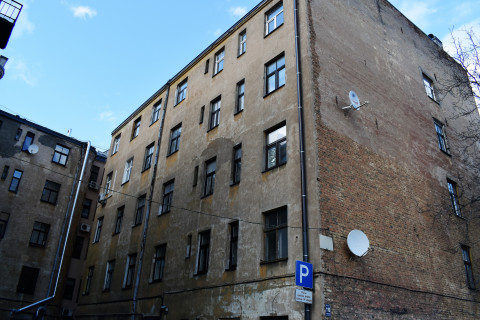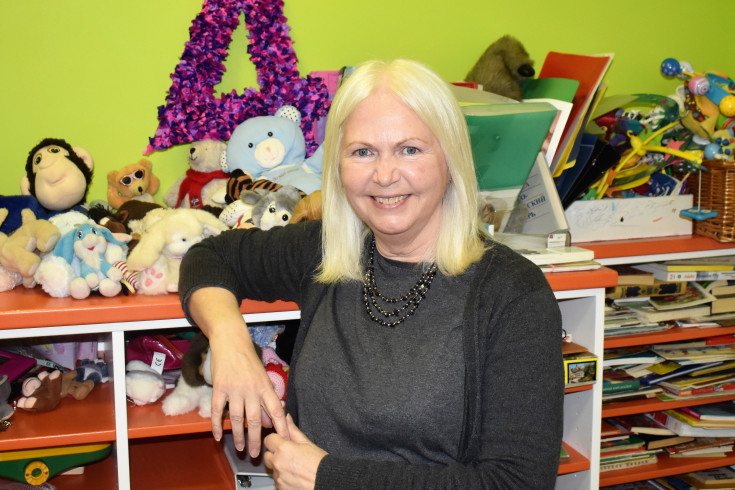One early 20th century apartment building at the rougher end of Riga’s city center looks very much like another. But press the buzzer on the door of one such block, and you discover a precious lifeline for some of the city’s most vulnerable residents.
Welcome to the headquarters of Hope for Children, a charity where many people have found a meal, a bed or a coat when they need it most. This warm hearth in an often-cold city was founded by UK-born Helen Vipass, a devout Christian with a deep calling to help youngsters in trouble.
Helen doesn’t have a family of her own. But over three decades, she has touched many lives in Latvia
“God had a plan to give me many other children, it seems,” she laughs. “And I am in touch with many of those who have been here, and it’s lovely seeing them grown up and married and having families of their own.”
Helen’s father emigrated to England after the Second World War and worked as a coalminer near Sheffield. But although the family didn’t mingle with the émigré Latvian community, she felt an urge to reconnect with their ancestral homeland.
She made several visits to Riga in the early 1980s, then taught English for a year in Irkutsk, prompting side-trips to meet long-lost relatives in Latvia. She also worked as a tour guide for two years, taking Western school pupils on excursions to Soviet cities.
Despite settling back in the UK with a nice house and a teaching job, she felt an inner calling. So in 1991, she became a lecturer at the University of Latvia. The newly independent country was in turmoil, with swiftly changing currencies, food rationing and bomb blasts courtesy of mafia gangs rattling the windows.
Joining a local Baptist church, and doing outreach work in Riga’s poorest neighbourhoods, she came face to face with the casualties of the dramatic economic transition.
“The cook cried because the children were so hungry,” she recalls. “Even many locals didn’t realise how many kids were literally starving.”
In 1994, Helen and a group of friends privatised several ground floor apartments to create the city centre facility. In the early days, there were no shelters in Riga, so under Helen’s care, children made homeless due to parental unemployment or alcoholism slept on mattresses “like sardines in a tin.”
“I was really thrown in at the deep end, and the first time I encountered the issue of drugs I cried my eyes out,” she says. “But little by little we managed, and money appeared miraculously.”

Helen poured her own savings into the mission, and a church in England sponsored them. She helped kids on the streets and in detention centres, and dealt with red tape and gangsters using children as thieves. And gradually, she found partners in other parts of Latvia, and today Hope for Children has branches in Skrunda and Liepāja in Kurzeme, the Riga suburbs Zolitūde and Bolderāja, and one set to open soon in Krāslava in Latgale. There’s also a summer house in Ķesterciems on the Gulf of Riga coast.
But this has happened by serendipity, not by a deliberate plan.
“When you find a precious person who has the same passion and real love for the children, you can build a centre,” she says. “But we have never gone to a town and said, OK, we’ll establish one here.”
The centres are run by five full-time and nine part-time staff as well as volunteers. More than half the donations come from individuals, mostly abroad, as well as churches, companies and organisations like the International Women’s Club of Riga. Helen says there is never time to actively solicit donations, but support always comes through somehow.
They distribute donated toys and clothing and give hot meals to underprivileged children and groceries to families who have spent all their money on medical bills or other emergencies. They also offer moral support and encouragement. Helen mentions several former street kids who have gone on to have careers and families of their own. One young man is a successful chef, and another, who also gives a lot of support to the charity, ran a chain of stores.
Extended family
The Covid crisis has brought fresh challenges. Restrictions of gatherings mean not as many people can come in person for help, so the center has been making more home visits. Helen notes a spike in alcoholism as jobless people drown their sorrows, and children are becoming withdrawn and malnourished due to excessive computer time and worrying about their troubled parents.
But she is also impressed by the resilience of local society.
“I think we’ve fared better here than they have in the West, where people aren’t used to big shocks and things closing down,” she says. “In Latvia, people are more geared up to deal with things. They’ve been through crises and devaluations and they’re much hardier.”
Financial donations to Hope for Children are welcome, and the details can be found at the organisation’s website. Clothing and shoes for children and teens, household goods and bed linen will also be gladly received. And right now, Helen says there’s a shortage of Latvian-language children’s books – if you have any gathering dust at home, get in touch.
This feature was originally published on the website of the Latvian Institute and is reproduced here with permission.
































